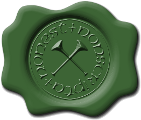
| Home | FAQs | Rules | Archives | Articles | Jobs | Links | KWHSS | OSCAR | SCA.org |
Collected Name Resources from LoARs (2010-present)
Articles from Juliana de Luna, Lillia de Vaux, and Alys Mackyntoich
Back to Collected Name Resources from LoARs- Middle English -
July 2010 - Juliana de Luna Link to LoAR Cover Letter
There is an enormous (and growing) number of resources online that can be useful to heralds and to submitters. Each month, I'm going to post information about some that I think might be useful. If I miss some interesting ones, let me know, because I don't know everything.
This month, I'm going to talk about the many uses of the Middle English Dictionary online (http://quod.lib.umich.edu/m/med/). The Middle English Dictionary is an online version of the print dictionary of the same name, published in 2001. Unlike the Oxford English Dictionary, it's free and doesn't require a subscription. It includes citations from 1066 until around 1500. That means that it can be used in place of the Oxford English Dictionary to document many common words.
The header forms are a little tricky to use, as they use Middle English spellings. Luckily, you can also search for spellings anywhere within the entry (including citations); to do this click on "Search the MED entries" rather than on "Lookups." The standard modern spelling of a word is normally used in the definition, so a search on the standard modern spelling will turn up the Middle English spelling (though it usually turns up lots of other hits too). Still, it's where I almost always find myself starting.
Many forms are directly dated with citations; turn on "with all open (or compact) display" to see the citations. However, all citations are definitely period, even if they're not clearly dated. The Middle English Dictionary often lists header forms that are not dated in individual citations; these spellings are also considered to date to the Middle English period.
One nifty feature of the Middle English Dictionary is that it includes byname and placename citations derived from words. Thus, it's sometimes very useful in looking at the forms (and spellings) for descriptive and locative bynames. We encourage people to use it for this and other purposes.
June 2011 - Juliana de Luna Link to LoAR Cover Letter
This month I celebrate a year writing this series. In honor of that, I'm going to open a new set of issues: the articles and books I most frequently use to document names from a given time and place. I've already talked about Old English sources (in August 2010), so now let's talk about Middle English.
Middle English is the term we use for medieval English, from the time of the Norman Conquest in 1066 until aroud the middle of the 15th century. It is followed by Early Modern English, which lasts until well after the end of our period.
For Middle English, the print resources are superb. For surnames, Reaney and Wilson's A Dictionary of English Surnames is still in print, and Bardsley's A Dictionary of English and Welsh Surnames is downloadable from Google Books (though some other books by him are mislabeled as this book; one copy is at http://books.google.com/books?id=RbkEAAAAIAAJ). For given names, Withycombe's The Oxford Dictionary of English Christian names is unfortunately out of print, but copies of it are readily available on the used book market. For placenames, Ekwall's The Concise Oxford Dictionary of English Place Names is out of print, but easy to find, and Mill's Dictionary of British Place-Names has replaced the earlier Dictionary of English Place-Names (the former is in print, the latter readily available as a used book).
Given these easily accessible and not very expensive print resources, it's not surprising that the online resources are not used as much. However, there are some good articles. One I use a great deal is Talan Gwynek's "Feminine Given Names in A Dictionary of English Surnames" (at http://heraldry.sca.org/laurel/reaneyintro.html among other places). Another is Jeanne Marie Lacroix's "'Misplaced'" Names in Reaney & Wilson" (http://heraldry.sca.org/laurel/names/misplacednames.htm), both of which take data from Reaney and Wilson, one of these important print resources, and make it easier to find.
At this time, there's also a lot of regional variability in names and even in the language itself. If you're aiming for a particular time and place, Aryanhwy merch Catmael and others have collected data from particular parts of England. These can be found at the Academy of Saint Gabriel Library (under http://www.s-gabriel.org/names/eng1066to1300.shtml and http://www.s-gabriel.org/names/eng1300to1450.shtml, depending on whether you want 1066 to 1300 or after 1300).
In Middle English, then, we have an embarrassment of resources. Curiously Early Modern English data is somewhat harder to come by; we'll talk about that next month.
Back to Collected Name Resources from LoARsThe heraldry.sca.org site is copyright 1995-2024 Society for Creative Anachronism, Inc. The copyright of certain portions of heraldry.sca.org are retained by the original contributors as noted.
External links are not part of the heraldry.sca.org web site. Inclusion of a page or site here is neither implicit nor explicit endorsement of the site. Further, SCA, Inc. is not responsible for content outside of heraldry.sca.org. For information on how SCA uses collected and submitted data, please see the Privacy Policy.
Paper texture used with permission from GRSites.com.